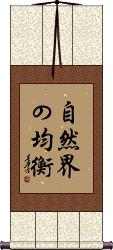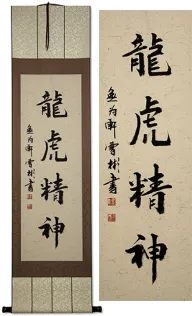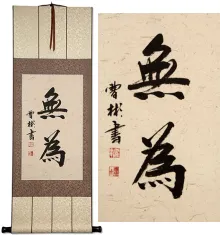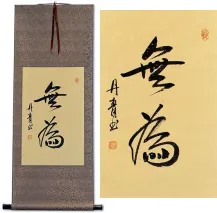Many custom options...
And formats...

Mother Nature in Chinese / Japanese...
Buy a Mother Nature calligraphy wall scroll here!
Personalize your custom “Mother Nature” project by clicking the button next to your favorite “Mother Nature” title below...
Mother Nature
大自然 is the simple way to express “mother nature” in Chinese, Japanese Kanji, and old Korean Hanja.
This can also be translated as “the great nature” or “all of nature.”
Nature in Balance / Balanced Nature
Nature in Balance / Balanced Nature
Nature in Balance / Balanced Nature
生態平衡 is a title about the way and balance of nature.
The first two characters mean nature or the way of life.
The second two characters mean balance or balanced.
Note: We have two versions of this title on our website. This is the one we recommend, as it is a little more natural (no pun intended).
Nature in Balance / Balanced Nature
自然界の均衡 is a verbose way to say “nature in balance” in Japanese.
The first three Kanji have the meaning of “the natural world” or “the natural kingdom” (kind of like the animal kingdom but including plants and all things biological).
The third character is a Hiragana that acts to connect the two ideas here.
The last two Kanji mean equilibrium or balance.
This in-stock artwork might be what you are looking for, and ships right away...
Gallery Price: $60.00
Your Price: $36.88
Gallery Price: $60.00
Your Price: $36.88
Gallery Price: $60.00
Your Price: $36.88
Gallery Price: $200.00
Your Price: $99.88
Gallery Price: $168.00
Your Price: $92.88
Gallery Price: $168.00
Your Price: $92.88
Gallery Price: $168.00
Your Price: $92.88
Gallery Price: $79.00
Your Price: $43.88
Not the results for mother nature that you were looking for?
Below are some entries from our dictionary that may match your mother nature search...
| Characters If shown, 2nd row is Simp. Chinese |
Pronunciation Romanization |
Simple Dictionary Definition |
大自然 see styles |
dà zì rán da4 zi4 ran2 ta tzu jan daishizen だいしぜん |
More info & calligraphy: Mother Naturenature; Mother Nature |
母なる see styles |
hahanaru ははなる |
(pre-noun adjective) (See 母なる自然) Mother (as in Mother Earth, Mother Nature, etc.) |
母なる自然 see styles |
hahanarushizen ははなるしぜん |
(exp,n) Mother Nature |
胎藏界 see styles |
tāi zàng jiè tai1 zang4 jie4 t`ai tsang chieh tai tsang chieh taizō kai |
Garbhadhātu, or Garbhakośa-(dhātu), the womb treasury, the universal source from which all things are produced; the matrix; the embryo; likened to a womb in which all of a child is conceived— its body, mind, etc. It is container and content; it covers and nourishes; and is the source of all supply. It represents the 理性 fundamental nature, both material elements and pure bodhi, or wisdom in essence or purity; 理 being the garbhadhātu as fundamental wisdom, and 智 acquired wisdom or knowledge, the vajradhātu. It also represents the human heart in its innocence or pristine purity, which is considered as the source of all Buddha-pity and moral knowledge. And it indicates that from the central being in the maṇḍala, viz. the Sun as symbol of Vairocana, there issue all the other manifestations of wisdom and power, Buddhas, bodhisattvas, demons, etc. It is 本覺 original intellect, or the static intellectuality, in contrast with 始覺 intellection, the initial or dynamic intellectuality represented in the vajradhātu; hence it is the 因 cause and vajradhātu the 果 effect; though as both are a unity, the reverse may be the rule, the effect being also the cause; it is also likened to 利他 enriching others, as vajradhātu is to 自利 enriching self. Kōbō Daishi, founder of the Yoga or Shingon 眞言 School in Japan, adopted the representation of the ideas in maṇḍalas, or diagrams, as the best way of revealing the mystic doctrine to the ignorant. The garbhadhātu is the womb or treasury of all things, the universe; the 理 fundamental principle, the source; its symbols are a triangle on its base, and an open lotus as representing the sun and Vairocana. In Japan this maṇḍala is placed on the east, typifying the rising sun as source, or 理. The vajradhātu is placed west and represents 智 wisdom or knowledge as derived from 理 the underlying principle, but the two are essential one to the other, neither existing apart. The material and spiritual; wisdom-source and intelligence; essence and substance; and similar complementary ideas are thus portrayed; the garbhadhātu may be generally considered as the static and the vajradhātu as the dynamic categories, which are nevertheless a unity. The garbhadhātu is divided into 三部 three sections representing samādhi or quiescence, wisdom-store, and pity-store, or thought, knowledge, pity; one is called the Buddha-section, the others the Vajra and Lotus sections respectively; the three also typify vimokṣa, prajñā, and dharmakāya, or freedom, understanding, and spirituality. There are three heads of these sections, i. e. Vairocana, Vajrapāṇi, and Avalokiteśvara; each has a mother or source, e. g. Vairocana from Buddha's-eye; and each has a 明王 or emanation of protection against evil; also a śakti or female energy; a germ-letter, etc. The diagram of five Buddhas contains also four bodhisattvas, making nine in all, and there are altogether thirteen 大院 or great courts of various types of ideas, of varying numbers, generally spoken of as 414. Cf. 金剛界; 大日; 兩部. |
摩訶摩耶 摩诃摩耶 see styles |
mó hē mó yé mo2 he1 mo2 ye2 mo ho mo yeh mokomaya |
mahāmāyā, intp. by M.W. as 'great deceit or illusion worldly illusion, the divine power of illusion (which makes the material universe appear as if really existing and renders it cognizable by the senses), the Great Illusion (the illusory nature of worldly objects personified and identified with Durgā)'. Mahāmāyā was the wife of Śuddhodana, and mother of Śākyamuni. He, Siddhārtha, was born 'from her right side', and she died seven days later, her sister Mahāprajāpati becoming his foster mother. Also called 摩訶第脾 Mahādevī; 摩訶夫人 Lady Māyā, etc. |
親は無くても子は育つ see styles |
oyahanakutemokohasodatsu おやはなくてもこはそだつ |
(expression) (idiom) Nature itself is a good mother |
Variations: |
oyahanakutemokohasodatsu おやはなくてもこはそだつ |
(exp,v5t) (proverb) nature itself is a good mother; even without parents, children grow up |
Variations: |
oyahanakutomokohasodatsu おやはなくともこはそだつ |
(exp,v5t) (proverb) nature itself is a good mother; even without parents, children grow up |
Variations: |
oyahanakutemokohasodatsu おやはなくてもこはそだつ |
(exp,v5t) (proverb) nature itself is a good mother; even without parents, children grow up |
Variations: |
oyahanakutomokohasodatsu おやはなくともこはそだつ |
(exp,v5t) (proverb) nature itself is a good mother; even without parents, children grow up |
The following table may be helpful for those studying Chinese or Japanese...
| Title | Characters | Romaji (Romanized Japanese) | Various forms of Romanized Chinese | |
| Mother Nature | 大自然 | dai shi zen daishizen | dà zì rán da4 zi4 ran2 da zi ran daziran | ta tzu jan tatzujan |
| Nature in Balance Balanced Nature | 自然平衡 | zì rán píng héng zi4 ran2 ping2 heng2 zi ran ping heng ziranpingheng | tzu jan p`ing heng tzujanpingheng tzu jan ping heng |
|
| Nature in Balance Balanced Nature | 自然の調和 | shizen no cho wa shizennochowa | ||
| Nature in Balance Balanced Nature | 生態平衡 生态平衡 | shēng tài píng héng sheng1 tai4 ping2 heng2 sheng tai ping heng shengtaipingheng | sheng t`ai p`ing heng shengtaipingheng sheng tai ping heng |
|
| Nature in Balance Balanced Nature | 自然界の均衡 | shizenkai no kinkou shizenkainokinkou shizenkai no kinko | ||
| In some entries above you will see that characters have different versions above and below a line. In these cases, the characters above the line are Traditional Chinese, while the ones below are Simplified Chinese. | ||||
Successful Chinese Character and Japanese Kanji calligraphy searches within the last few hours...


















